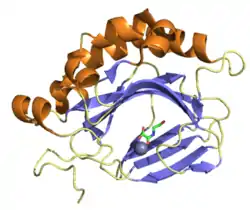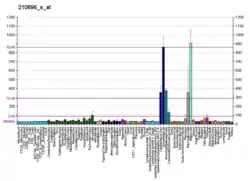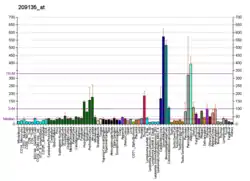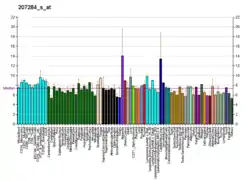ASPH
Aspartyl/asparaginyl beta-hydroxylase (HAAH) is an enzyme that in humans is encoded by the ASPH gene.[5][6][7] ASPH is an alpha-ketoglutarate-dependent hydroxylase, a superfamily non-haem iron-containing proteins.
Function
This gene is thought to play an important role in calcium homeostasis. Alternative splicing of this gene results in five transcript variants which vary in protein translation, the coding of catalytic domains, and tissue expression. Variation among these transcripts impacts their functions which involve roles in the calcium storage and release process in the endoplasmic and sarcoplasmic reticulum as well as hydroxylation of aspartic acid and asparagine in epidermal growth factor-like domains of various proteins.[7]
Clinical significance
As early as 1996, the over-expression of HAAH was recognized as an indicator of carcinoma in humans. Further research has correlated elevated HAAH levels (variously in affected tissue or blood serum) with hepatocellular (liver) carcinoma[8][9] adenocarcinoma (pancreatic cancer),[10] colorectal cancer,[11] prostate cancer.[9] and lung cancer.[12] The pancreatic study[10] showed elevated HAAH only in diseased tissue, but not in adjacent normal and inflamed tissue.
Mutations in ASPH cause Traboulsi syndrome.[13]
References
- GRCh38: Ensembl release 89: ENSG00000198363 - Ensembl, May 2017
- GRCm38: Ensembl release 89: ENSMUSG00000028207 - Ensembl, May 2017
- "Human PubMed Reference:". National Center for Biotechnology Information, U.S. National Library of Medicine.
- "Mouse PubMed Reference:". National Center for Biotechnology Information, U.S. National Library of Medicine.
- Korioth F, Gieffers C, Frey J (December 1994). "Cloning and characterization of the human gene encoding aspartyl beta-hydroxylase". Gene. 150 (2): 395–9. doi:10.1016/0378-1119(94)90460-X. PMID 7821814.
- Lim KY, Hong CS, Kim DH (September 2000). "cDNA cloning and characterization of human cardiac junctin". Gene. 255 (1): 35–42. doi:10.1016/S0378-1119(00)00299-7. PMID 10974562.
- "Entrez Gene: ASPH aspartate beta-hydroxylase".
- Ince N, de la Monte SM, Wands JR (March 2000). "Overexpression of human aspartyl (asparaginyl) beta-hydroxylase is associated with malignant transformation". Cancer Research. 60 (5): 1261–6. PMID 10728685.
- Xue T, Xue XP, Huang QS, Wei L, Sun K, Xue T (August 2009). "Monoclonal antibodies against human aspartyl (asparaginyl) beta-hydroxylase developed by DNA immunization". Hybridoma. 28 (4): 251–7. doi:10.1089/hyb.2009.0017. PMID 19663697.
- Palumbo KS, Wands JR, Safran H, King T, Carlson RI, de la Monte SM (July 2002). "Human aspartyl (asparaginyl) beta-hydroxylase monoclonal antibodies: potential biomarkers for pancreatic carcinoma". Pancreas. 25 (1): 39–44. doi:10.1097/00006676-200207000-00010. PMID 12131769. S2CID 2098747.
- "CC Detect - Serum-Based Diagnostic Test For Colon Cancer Available".
- Hampton T (November 2007). "New screening techniques show potential for early detection of lung cancer". JAMA. 298 (17): 1997. doi:10.1001/jama.298.17.1997. PMID 17986689.
- Patel N, Khan AO, Mansour A, Mohamed JY, Al-Assiri A, Haddad R, et al. (May 2014). "Mutations in ASPH cause facial dysmorphism, lens dislocation, anterior-segment abnormalities, and spontaneous filtering blebs, or Traboulsi syndrome". American Journal of Human Genetics. 94 (5): 755–9. doi:10.1016/j.ajhg.2014.04.002. PMC 4067561. PMID 24768550.
External links
Further reading
- Hirota K, Semenza GL (December 2005). "Regulation of hypoxia-inducible factor 1 by prolyl and asparaginyl hydroxylases". Biochemical and Biophysical Research Communications. 338 (1): 610–6. doi:10.1016/j.bbrc.2005.08.193. PMID 16154531.
- Lavaissiere L, Jia S, Nishiyama M, de la Monte S, Stern AM, Wands JR, Friedman PA (September 1996). "Overexpression of human aspartyl(asparaginyl)beta-hydroxylase in hepatocellular carcinoma and cholangiocarcinoma". The Journal of Clinical Investigation. 98 (6): 1313–23. doi:10.1172/JCI118918. PMC 507557. PMID 8823296.
- Zhang L, Kelley J, Schmeisser G, Kobayashi YM, Jones LR (September 1997). "Complex formation between junctin, triadin, calsequestrin, and the ryanodine receptor. Proteins of the cardiac junctional sarcoplasmic reticulum membrane". The Journal of Biological Chemistry. 272 (37): 23389–97. doi:10.1074/jbc.272.37.23389. PMID 9287354.
- Wetzel GT, Ding S, Chen F (March 2000). "Molecular cloning of junctin from human and developing rabbit heart". Molecular Genetics and Metabolism. 69 (3): 252–8. doi:10.1006/mgme.2000.2966. PMID 10767180.
- Dinchuk JE, Henderson NL, Burn TC, Huber R, Ho SP, Link J, et al. (December 2000). "Aspartyl beta -hydroxylase (Asph) and an evolutionarily conserved isoform of Asph missing the catalytic domain share exons with junctin". The Journal of Biological Chemistry. 275 (50): 39543–54. doi:10.1074/jbc.M006753200. PMID 10956665.
- Treves S, Feriotto G, Moccagatta L, Gambari R, Zorzato F (December 2000). "Molecular cloning, expression, functional characterization, chromosomal localization, and gene structure of junctate, a novel integral calcium binding protein of sarco(endo)plasmic reticulum membrane". The Journal of Biological Chemistry. 275 (50): 39555–68. doi:10.1074/jbc.M005473200. PMID 11007777.
- Kirchhefer U, Neumann J, Baba HA, Begrow F, Kobayashi YM, Reinke U, et al. (February 2001). "Cardiac hypertrophy and impaired relaxation in transgenic mice overexpressing triadin 1". The Journal of Biological Chemistry. 276 (6): 4142–9. doi:10.1074/jbc.M006443200. PMID 11069905.
- Sepe PS, Lahousse SA, Gemelli B, Chang H, Maeda T, Wands JR, de la Monte SM (July 2002). "Role of the aspartyl-asparaginyl-beta-hydroxylase gene in neuroblastoma cell motility". Laboratory Investigation; A Journal of Technical Methods and Pathology. 82 (7): 881–91. doi:10.1097/01.lab.0000020406.91689.7f. PMID 12118090.
- Ho SP, Scully MS, Krauthauser CM, Wexler EJ, Stow MD, Dinchuk JE, et al. (August 2002). "Antisense oligonucleotides selectively regulate aspartyl beta-hydroxylase and its truncated protein isoform in vitro but distribute poorly into A549 tumors in vivo". The Journal of Pharmacology and Experimental Therapeutics. 302 (2): 795–803. doi:10.1124/jpet.302.2.795. PMID 12130746.
- Strausberg RL, Feingold EA, Grouse LH, Derge JG, Klausner RD, Collins FS, et al. (December 2002). "Generation and initial analysis of more than 15,000 full-length human and mouse cDNA sequences". Proceedings of the National Academy of Sciences of the United States of America. 99 (26): 16899–903. Bibcode:2002PNAS...9916899M. doi:10.1073/pnas.242603899. PMC 139241. PMID 12477932.
- Maeda T, Sepe P, Lahousse S, Tamaki S, Enjoji M, Wands JR, de la Monte SM (May 2003). "Antisense oligodeoxynucleotides directed against aspartyl (asparaginyl) beta-hydroxylase suppress migration of cholangiocarcinoma cells". Journal of Hepatology. 38 (5): 615–22. doi:10.1016/S0168-8278(03)00052-7. PMID 12713872.
- Treves S, Franzini-Armstrong C, Moccagatta L, Arnoult C, Grasso C, Schrum A, et al. (August 2004). "Junctate is a key element in calcium entry induced by activation of InsP3 receptors and/or calcium store depletion". The Journal of Cell Biology. 166 (4): 537–48. doi:10.1083/jcb.200404079. PMC 1868564. PMID 15302852.
- Beausoleil SA, Jedrychowski M, Schwartz D, Elias JE, Villén J, Li J, et al. (August 2004). "Large-scale characterization of HeLa cell nuclear phosphoproteins". Proceedings of the National Academy of Sciences of the United States of America. 101 (33): 12130–5. Bibcode:2004PNAS..10112130B. doi:10.1073/pnas.0404720101. PMC 514446. PMID 15302935.
- Xian ZH, Zhang SH, Cong WM, Yan HX, Wang K, Wu MC (February 2006). "Expression of aspartyl beta-hydroxylase and its clinicopathological significance in hepatocellular carcinoma". Modern Pathology. 19 (2): 280–6. doi:10.1038/modpathol.3800530. PMID 16341145.
- de la Monte SM, Tamaki S, Cantarini MC, Ince N, Wiedmann M, Carter JJ, et al. (May 2006). "Aspartyl-(asparaginyl)-beta-hydroxylase regulates hepatocellular carcinoma invasiveness". Journal of Hepatology. 44 (5): 971–83. doi:10.1016/j.jhep.2006.01.038. PMID 16564107.
- Feldmann G, Nattermann J, Nischalke HD, Gorschlüter M, Kuntzen T, Ahlenstiel G, et al. (June 2006). "Detection of human aspartyl (asparaginyl) beta-hydroxylase and homeobox B7 mRNA in brush cytology specimens from patients with bile duct cancer". Endoscopy. 38 (6): 604–9. doi:10.1055/s-2006-925065. PMID 16673309.
- Gundogan F, Elwood G, Greco D, Rubin LP, Pinar H, Carlson RI, et al. (January 2007). "Role of aspartyl-(asparaginyl) beta-hydroxylase in placental implantation: Relevance to early pregnancy loss". Human Pathology. 38 (1): 50–9. doi:10.1016/j.humpath.2006.06.005. PMID 16949909.







